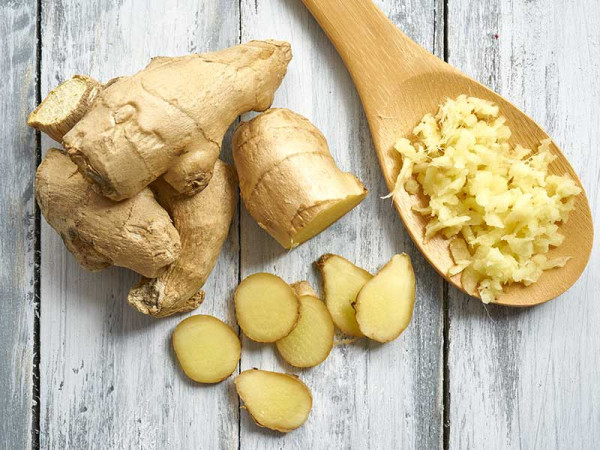In the Orient, ginger has been considered a miracle plant for over 3000 years. In this country, too, it is now on everyone's lips. Because ginger not only adds pep to food. The big hit tuber holds a whole treasure trove of essential oils, minerals and vital substances. We explain how effective ginger is and how you can prepare it.
What's in it, in the ginger?
The ginger plant is quite inconspicuous. The herbaceous plant reminds a little bit of reeds. Its full plant power is only revealed underground. This is where the coveted wonder tuber grows, a widely ramified rhizome that is full to bursting with healthy essential oils, the pungent gingerols and shogaols as well as zingerone, borneol, cineole, magnesium, potassium, sodium, iron, calcium, phosphorus and vitamin C.
In South and East Asia, the health value of the ginger plant has long been recognised. Ginger is used especially in Ayurvedic teaching and traditional Asian medicine.
Today the ginger tuber can be found in every supermarket. It is more popular than ever before - and with good reason.
How ginger works
The ginger root is said to have numerous positive properties: it is antioxidative, antibacterial, metabolism-promoting, anti-inflammatory and suppresses nausea. It also promotes the formation of gastric juice, saliva and bile and is therefore good for the intestinal flora.
The biggest secret of the ginger tuber: the spicy aromatic gingerols and shogaols. They are not only responsible for the typically exotic taste and pungency of ginger, but also for many of its health properties.
Cooking with ginger
It is hard to imagine Asian cuisine without ginger. The pungent root is often added to meals or drinks in grated, sliced or ground form.
Ginger brings a slight pungency to food, tastes spicy and a little fruity. It is suitable for many dishes and goes with almost everything: with fish or meat, in curries, in vegetables, in soups, in desserts or as tea.
How to prepare ginger
It is best to use ginger of organic quality. It does not contain any harmful substances, and if the peel remains on during cooking, that is not too bad.
But if you want the ginger peel to come off, it's not so easy. If you peel the crooked tuber with a knife, it can happen that you cut off too much of the valuable fruit yourself. A simple trick: Take a spoon and simply scrape off the skin with the end of the stem. This is child's play, just try it once.
Ginger recipe ideas
Ginger tea
Ginger tea is quickly prepared and has an antibacterial and anti-inflammatory effect when itchy in the throat and also when the cold has already gotten the better of you.
Cut off a thumb-thick piece of ginger and peel it if you like. Then pour hot water over it and let it stand for about 15 minutes. Enough for a small pot of tea.
The ginger tea becomes even more aromatic with thyme, mint, lemon and/or lemongrass.
As thirst quencher: ginger water
The ginger water is prepared like ginger tea and enjoyed pure. Just let it cool down and drink it throughout the day.
The all-rounder: Golden milk
The bright yellow-golden milk with turmeric and ginger has been appreciated for centuries in China or India.
The ingredients:
- 500 ml vegetable milk (e.g. almond, soy or oat milk)
- Turmeric (2 teaspoons powder or a 2 cm small piece of fresh turmeric)
- Ginger (a 2 cm small piece of fresh ginger)
- ½ teaspoon cinnamon
- ¼ teaspoon freshly ground black pepper
- 1 pinch of freshly ground nutmeg
- 1 teaspoon coconut oil
- As desired: sugar/maple syrup/agaven syrup/dates for sweetening
Pour all the ingredients for the golden milk into a blender and mix briefly. Then heat the milk in a pot, but do not let it boil. Alternatively, the Golden Milk can be prepared without a blender. For this, you should finely grate the fresh ginger and turmeric - and stir all the ingredients well once.
The warming ends: Soups with ginger
You can refine many soups with the spicy, hot aroma of fresh ginger: for example, a classic carrot soup can quickly become a refined carrot-ginger soup.
All you have to do is sweat finely diced onions, garlic and carrots, as well as peeled and finely chopped ginger, deglaze with vegetable stock and bring to the boil. If you prefer a creamy consistency, you can puree the soup.
You can vary this carrot-ginger soup again and again, for example with coconut milk or fruity oranges.
This might also interest you
-
How to get through the autumn well: Vital substances for your immune system
Everywhere harmful viruses and bacteria lurk, just waiting to enter our bodies. So you can strengthen your defences. -
Pumpkin - the tasty autumn classic with many vitamins
Whether Hokkaido, Butternut or Patisson - the healthy fruits simply taste good. What's more, they are blessed with valuable vital substances and vitamins and are therefore very healthy.
Picture: istockphto.com | piotrszczepanekfotoart











